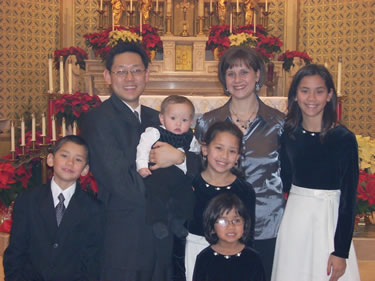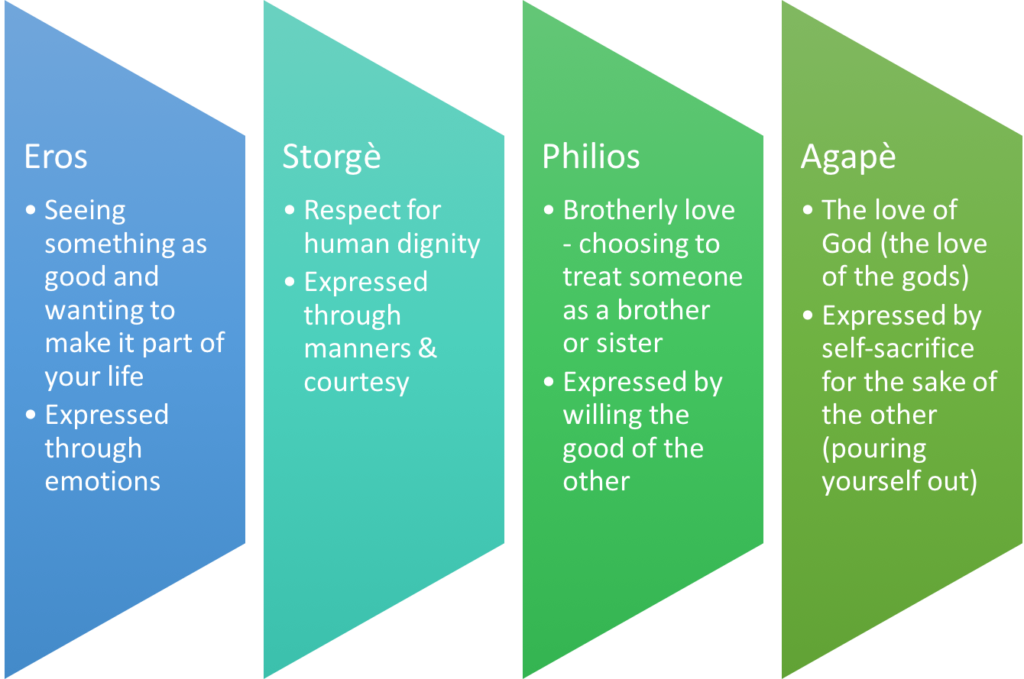Lessons of Life and Love

As images of God, human persons are created for love. This is good news! We are the only bodily creatures called to the vocation of love. This sets us apart from the animals and plants. Human beings are the “crown of creation.” We are called to “will the good of another” through self-giving, generous love.
Our ability to love and create new life is a gift given to us by God and like any other gift, it needs to be properly formed, respected and protected. Children need to be taught to esteem and safeguard their ability to love so they will develop healthy, happy, and holy relationships. This education in love is the right and duty of the parents.
What is Love?
What exactly is love? It seems like this should be a fairly easy question to answer because we talk about love all the time. It is the focus of most movies, songs and books. It is the supposed glue that bonds a family together. It is referred to as “the greatest virtue of them all”. People fall into and out of it. But, do we really understand what love is?
In today’s culture there is great misunderstanding about the true meaning of love. Part of the confusion stems from the fact that we have only one word to describe something that has many facets. Consider that in ancient Greek times, there were four words to describe love and each word depicted one aspect of human love.
Four Levels of Love

The first and most base level of love was called ‘eros’ or erotic love. Eros is the love of attraction. It is the recognition of something good and the desire to possess it. Within human relationships this aspect of love often takes the form of sexual attraction. However, it may also include elements of friendship that we find enjoyable or beneficial. If we only love others on this level, we run the danger of using others as objects rather than loving them as persons. However, eros can be healthy and good when mixed with higher forms of love.
The second level of love honored by the ancient Greeks was storgè. Storgè is the love we show to our fellow human beings, just because they are human. It’s a recognition of human dignity. We express storgè mainly through the use of manners and acts of common courtesy.
The third level of love in ancient Greek times was known as philios, or brotherly love. Philios was considered by the Greeks to be the noblest form of love until Christ came to teach us the perfection of love. It was considered the noble bond of friendship. It can best be defined as “willing the good of the other.” This form of love is selfless in the sense that your concern is for the beloved before it is for yourself. Such love can bring great balance to eros and can enliven filial love.
The highest from of love is “agapè” love. Agape is the complete gift of yourself for the sake of the other. Jesus revealed agape love to us when He died on the cross to save us from our sins. For Christians, the cross is the sign of perfect love. Jesus challenges us to love as He loved – to love perfectly by making ourselves a complete gift to others. Agape love makes erotic love a selfless appreciation of the good. It perfects filial love, especially between spouses. It ensures philial love. Agape goes beyond just choosing what is good for others to being willing to sacrifice everything to secure the good for them. Agape is the goal of the Christian life. If you want your children to find true happiness, teach them to love completely and selflessly by making themselves a gift to others.
It would be helpful if our modern day vocabulary utilized these terms from ancient times. Breaking open the multiple meanings of love brings one to a deeper understanding of authentic love.
True Love
Gratefully, the Catechism of the Catholic Church has found a definition of love that encompasses the fullness of the Greek words. Authentic love is the capacity to “will the good of another” (CCC 1766). This meaning helps us identify when affection is real and when it is not. Willing the good of another requires four characteristics.
- First, real love is a free choice based on knowledge.
- Secondly, it is a total gift of self.
- Third, real love is permanent – it will never end.
- Fourth, it is life-giving.
One can be assured that affection, bonding and attraction is truly love when all four of these attributes are present.
